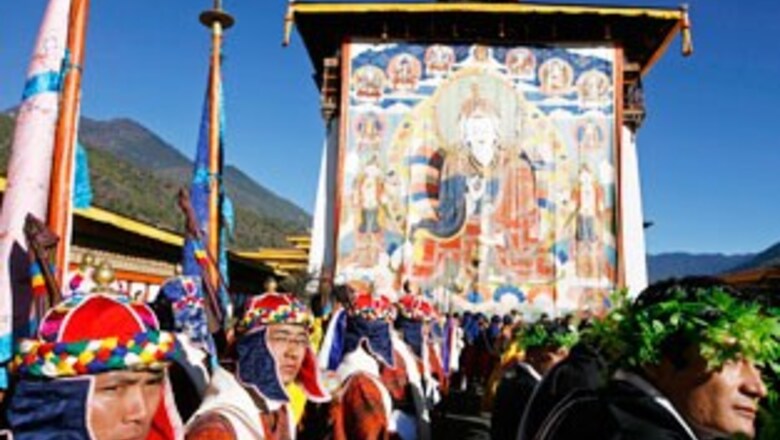
views
With no end in sight to the current downturn, countries are being forced on the back foot, and their heads are talking bail-out deals. Down and out, people are beginning to wonder whether there are any places left which might provide them with a safe haven.
The good news is, yes, there are. We have cherry-picked six places which are relatively out of the danger zone. While the rest of the world might be going through a trough, these six hotspots offer a ray of hope.
1. Faroe Islands, Denmark
If you’ve heard of the Faroe Islands, it’s most likely because of the $52-million loan they made out to Iceland in October. A tiny Danish province, it is a self-governing group of 18 islands strung out between Iceland and Norway. The Faroe Islands haven’t always been so independent though. In the early 1990s, the autonomous region faced an economic crisis pushing it to the edge of bankruptcy, inducing many residents to move to the Danish mainland.
The 48,000 Faroese people left may now have it better than the rest of us. The economy of the Faroe Islands has rebounded in the last few years and in 2006, unemployment was at 3% in the province, one of the lowest rates in Europe.
While the region’s main revenues come from the fishing industry, petroleum recently found in the Faroese area has promised an alternate source of prosperity.
For newcomers to the Faroe Islands, copious jobs await. Because many young students move to Denmark after high school, leaving behind only the elderly, the Faroese have for the past few years been left with hundreds of job vacancies. Any takers?
2. Washington D.C., United States
Call it irony, but the country which got us into the mess, the US, offers a strong contender for the safe haven spot: Washington D.C.
With a hefty workforce of 600,000 residents and a daytime population that bulges to more than one million, the city would be vulnerable to the continuous hacking of American jobs, except for one thing: most of the city is fuelled by the US government.
PAGE_BREAK
The federal government accounts for 27% of the jobs in the district, which houses the centres of the executive, legislative, and judicial branch. That’s not counting 172 foreign embassies, and companies responsible for defense and homeland security. Add to that mix lawyers, lobbyists, accountants and journalists that are attached to the government.
As of May 2008, the Washington Metropolitan Area had an unemployment rate of 3.5% (close to that of the Faroese), which was the lowest rate among the 40 largest metro areas in the US, and lower than the national average unemployment rate during that period, which stood at 5.2%.
Some suggest that the crisis may even create a surfeit of jobs in the capital, as the Federal government hires Wall Street experts to help out. The virtually free District of Columbia Public School system plus the cheap Metrorail public transport system also makes the city more liveable than others in the US during the downturn.
If you still want to be a part of the global hysteria, while you’re there, you can always visit Recession’s Restaurant (L St, NW # 1, Washington, DC 20036, United States, +1 202-296-6686) for a quick dose. Then return to your stable government job and thank the stars for the arrival of your salary so you can pay for that big lunch you had.
3. Larsemann Hills, Antarctica
With the world’s blood already running cold, Antarctica with its record low temperatures of -89 degrees Celsius may not seem worthy of this list. But the place has its merits. There are 44 permanent research bases maintained by 18 countries here. Many of these are manned year-round and the number of people on the continent varies from approximately 5,000 in summer to 1,000 in winter. And like in Washington D.C., government jobs aren’t being cut.
India too maintains a permanent research base, Maitri, on the continent. A new research base was commissioned at Larsemann Hills in East Antarctica, to be installed by 2009. This will eventually replace Maitri.
Larsemann Hills area is also among the most inhabitable on the continent. It has favourable drinking water and topography for living conditions. And activities and research have not been affected by the slowdown.
PAGE_BREAK
Antarctica has no government of its own, and belongs to no country. The only recession the continent has ever seen is its West Antarctic glacier, which has been attributed to global warming. For now, it might be the best place to take refuge from the meltdown on the other six continents.
4. Non-Starbucks-consuming countries
Daniel Gross, an American journalist, offers a simple theory to identify which countries will be most affected by the economic downturn. His “Starbucks Theory of International Economics”, published on Slate.com, states that more the number of Starbucks outlets a country has, more the likelihood of it being hit by the recession.
He argues that Starbucks personifies the crisis—triggered by the subprime and credit bubbles—because the coffee chain followed new housing developments to open new outlets, and became a meeting place for real estate brokers and clients. He calls the caffeinated giant, “fuel for the boom, the caffeine that enabled deal jockeys to stay up all hours offering papers for CDOs (collateralized debt obligations), and helping mortgage brokers work overtime processing dubious loan documents.”
According to him, countries with more Starbucks outlets are better connected to the global economy. Such countries have seen businesspeople fritter away money on over-priced coffee, and are willing to adopt an American style of business over their own.
So, places that don’t have Starbucks are safe havens.
Gross cites Africa, with just three Starbucks, as a place where banks have not failed. Central America, which has zero Starbucks, has had few bailouts. Argentina, at long last a stalwart economy, has only one store. Italy, with zero Starbucks outlets, has a banking sector that isn't very operational globally, and has seen little disaster.
What about India? Gross doesn’t touch on that. While Starbucks was keen to enter India, it withdrew its application from the Foreign Investment Promotion Board, which approves foreign investments into the country, because the chain wanted a majority holding structure (overseas brands in India can’t hold more than 51%).
PAGE_BREAK
But with the rise of a caffeinated middle class which meets at the Café Coffee Days and Baristas for a coffee 15 times more expensive than roadside tea, market experts say Starbucks can’t ignore India for long. With the recession deepening and lengthening, and Starbuck’s eye on India, perhaps it’s time to move to a remote village Starbucks won’t touch.
5. Nagorno Karabakh
In a recent speech in Delhi, Prime Minister Manmohan Singh encouraged banks to provide liquidity to ensure there were no disruptions in economic activity. This came just days after the Sensex fell below 10,000.
Contrast to Nagorno Karabakh, a remote enclave located in Azerbaijan near the Armenian border. Though the province is disputed by the two countries, it unilaterally declared itself an independent republic in 1991. In a recent speech, Nagorno Karabakh’s Prime Minister Arayik Harutyunyan said that despite the reduced cash flow from outside the enclave, the volume of bank deposits in the republic are actually growing.
Nagorno Karabakh may be unaffected because of its essentially isolated business sector, which is largely state-run. But Harutyunyan has a lot to be happy about. Not only has the volume of deposits in banks gone up 22.7 percent from January to October, but the volume of loans credited by commercial banks also went up by 55.6 percent during that period. While giant banks collapse around the world, from the US to Iceland, an Armenia-based AmeriaBank just opened its first affiliate in Karabakh early in November. The total capital of the bank is 17 billion Armenian dram ($56,650,000).
Retail sales are also up in the region: 7.7 percent in the first nine months of 2008 over the previous year’s indicator for the same time period. Compare this to November in the US, where retail chains saw the worst monthly sales in a decade.
Total income in Nagorno Karabakh from January to September of this year has grown 22.2 percent compared to the same time period in 2007, according to the National Statistic Service. GDP share per head has also grown.
At the opening ceremony of AmeriaBank, RA Central Bank Chairman Artur Javadyan said Armenia’s banking system is stable and overcapitalised. He also said: “As of today we have no problems at all.” Bold words, but reassuring ones for anyone looking for a safe place to hide.
6. Bhutan
If you don’t believe that any place is truly safe from the effects of the recession, you are probably right. The answer may be not to focus on measuring wealth. The Kingdom of Bhutan thinks so. Instead of measuring Gross Domestic Product (GDP), the country lives by an index of Gross National Happiness (GNH).
The GNH index was created in 1972 by the then king Jigme Singye Wangchuck, after continued reports on Bhutan’s ramshackle economy. The country soon stopped measuring how productive its citizens were through GDP. Instead, the small Himalayan nation now lives only by the measure of how happy its citizens are.
The index is based on the idea that the true development of a country cannot be just material development, but spiritual development as well—an approach that befits Bhutan’s Buddhist culture.
There are four pillars of GNH: the promotion of equitable and sustainable socio-economic development, preservation and promotion of cultural values, conservation of the natural environment, and establishment of good governance.
Bhutan is not a refuge from financial woes. The country has a very low GDP. In 2007, Bhutan had the second fastest growing economy in the world, with an annual economic growth rate of 22.4 percent. But most of this was due to the commission of the Tata Hydroelectricity project. The GNH, on the other hand, is succeeding in its ambition. According to Business Week in 2006, a global survey conducted by the University of Leicester rated Bhutan the happiest country in Asia and the eighth happiest country in the world. India ranks 125th. If you can’t beat the financial crisis, at least in Bhutan you can beat the recession blues.
(Elizabeth Flock is an associate reporter with the new business magazine to be launched by Network18 in association with Forbes, USA. )




















Comments
0 comment